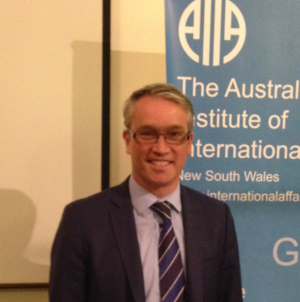US Foreign Policy after Trump?
US Foreign Policy after Trump? Our analyst at Glover Cottages on Tuesday 27 September was Tom Switzer, senior fellow at the University of Sydney’s US Studies Centre and well-known host on ABC Radio National. His timely address coincided with the first presidential debate.
Tom observed that a majority of Americans feel that the country is losing its way. The economy is sluggish. Living standards are being eroded. Jobs are moving offshore, encouraged by free trade deals. Illegal migration is feared. Race tensions are leading to an increase in street violence. The country’s external status is degraded as military actions become more expensive, counter-productive and ineffective. Anger at perceived ineptitude in Washington grows. Against this background, Trump is seen by middle Americans as refreshing and iconoclastic, to the right of conservative Republicans yet more radical than conventional Democrats, embodying a satisfying plague on both their houses.
On America’s foreign policy, Tom noted that Trump rejects Fukuyama’s vision, reinforced by Republicans Rice, Rove, Wolfowitz, Cheney and Rumsfeld, that America’s world-wide duty is to enforce the universality of liberal democracy and free-market capitalism. He believes that the United States is no longer a super power, capable of defending its allies. Let them pay more for American protection, he says. Let Japan, South Korea or Europe look after themselves, and have nuclear weapons if that is what deterrence takes. Meanwhile, Trump castigates Obama as inept, antagonising China and Russia, making Libya, Iraq and Syria into failed states, allowing such third-world leaders as Duterte in the Philippines to insult him by calling him the son of a whore. Trump wants to reverse this ineptitude and lack of respect, using the country’s undoubted military strength to make it respected again, a seductive clarion call that resonates with many disaffected middle Americans.
In the first of three presidential debates, Tom thought Hillary Clinton had won on grounds of logic and knowledge, but this will not deter Trump supporters who are driven by emotion. Like the majority of his audience, Tom gave Clinton the edge, but without hazarding any confident prediction as to who will win the race. Even if Clinton wins, the social symptoms that have allowed Trump to confound the analysts so far will continue to influence and colour American society. Tom’s prediction was that the United States may become what he termed an ‘off-shore balancer’, preserving US hegemony in the country’s immediate sphere of influence, and letting its more distant allies sort out their own problems. This will be the consequence of an increasing recognition of the limits of American capacity to influence the world. Tom agreed with one questioner that such a prediction will not be popular in Canberra, where politicians and public servants may well be in a state of denial about the mood in the United States and its possible consequences for the future of Australian defence policy.
Report by Richard Broinowski
